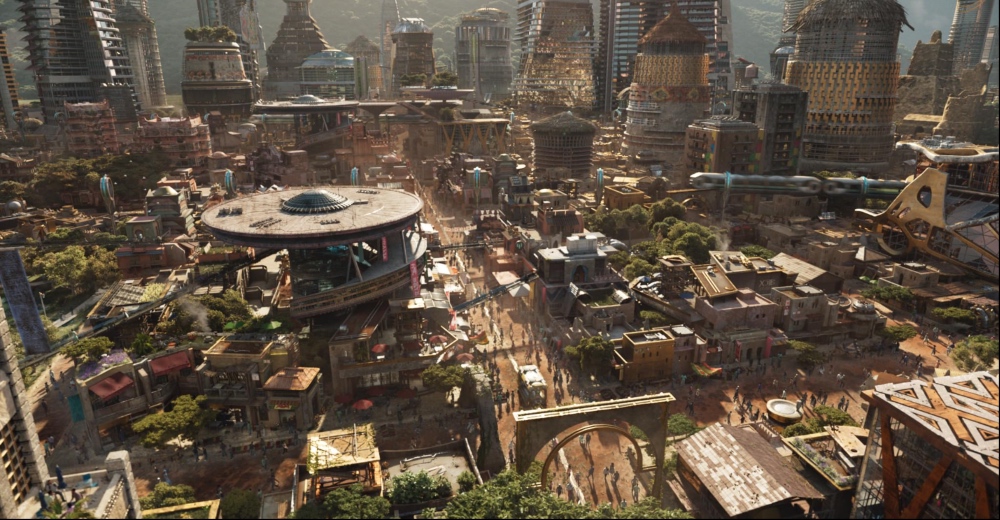Where Is Wakanda Located & Is It a Real Country?

Join the community on Reddit for the latest Marvel & DC news!
Marvel’s ‘Black Panther‘ hit theaters in 2018. Chadwick Boseman’s take on one of Marvel’s first black superheroes took the world by storm earning $1.3 billion, making it the highest-grossing movie by actors of color. But it also introduced fans to the beautiful, green, futuristic world of Wakanda, where Black Panther hails from. But is Wakanda a real country in Africa?
Sadly, Wakanda isn’t real. It is a fictional country in the Eastern part of Africa in the Marvel Cinematic Universe and comic books published by Marvel Comics. The fictional African nation first appeared in the 1966 ‘Fantastic Four’ #52, written by Stan Lee and Jack Kirby.
Its geographical location in the real world would border Uganda, Kenya, and Ethiopia. But we know this kingdom’s origins, its people, and why its most valuable metal is one of the most sought-after minerals by both villains and heroes in the MCU. Read on to learn more about the powerful African kingdom of Wakanda!
The Origins of Wakanda

Marvel comic writers imagined Wakanda as a kingdom that didn’t suffer the horrors of European colonialism; instead, they discovered a powerful natural resource that powers their superior technology and nation today.
In the comics, Wakanda was once inhabited by warring African tribes before a massive meteorite crashed into Earth. This meteor, now known as Vibranium, could absorb sound and energy. Wakandans who dared to go near the meteorite would get sick, exhibit demonic traits, and even die.
The radiation from the mineral affected the flora and fauna in the area, giving rise to the Heart-Shaped Herb consumed by members of the Black Panther cult. Shaman Olumo Bashega prayed to the Panther God to defeat these demons, ate the heart-shaped herb, and survived, making him the first Black Panther. Bashega would unite 4 of 5 fighting tribes to become the first king of Wakanda. Over time, invaders from Africa, Europe, and hell attempted to infiltrate Wakanda but failed. Wakanda is still impenetrable thanks to its advanced technology powered by Vibranium.
The People and Technology of Wakanda
Wakanda’s beautiful people have remained isolated from the rest of the world for decades. Their capital city is Birnin Zana, and the entire kingdom has a population of six million. The common languages in the small yet mighty empire include Yoruba, Hausa, Swahili, and Wakandan. But they can also speak other languages like English and French due to their advanced education system. In ‘Captain America: Civil War,’ T’Challa and King T’Chaka (John Kani) speak in Xhosa, a common language in South Africa and Zimbabwe.
Everyone in the world is trying to get their hands on Vibranium. This natural resource was once thought only to be found on their land, but after ‘Black Panther: Wakanda Forever,’ it could be anywhere in the world or the sea.
Because of their isolation, Wakanda’s technology developed much faster and differently than the rest of the world. Their computer system is way ahead of Tony Stark’s J.A.R.V.I.S. and almost impossible to hack. The basis of their high-end tech is Vibranium making it virtually indestructible too.
Wakandans can also communicate using Kimoyo beads that are similar to mobile phones. Hand movements identical to sign language allow Wakandans to send messages and texts. A.V. beads can also access video files from the Wakandan database through its adjustable holographic display. ‘Black Panther: Wakanda Forever’ features some of this tech.
Wakanda Functions like a Real Country

Despite being fictional, Wakanda functions like most countries in the real world with a monarchy. They have a currency, the Wakandan dollar, and their land, with tons of natural resources like Vibranium, coal, diamonds, and uranium, and a king rules the country. Their system of government is a constitutional monarchy with chiefs as the heads of each tribe. Wakanda has over 15 united tribes united under the rule of the Black Panther.
In Wakanda, the Black Panther is the chief/King of all the tribes, but a citizen from another clan can challenge his position. To support the King is the council of elders, Taiga Ngao, who help run the nation and advise on important matters. For a long time, Wakandans preferred to be isolated for years, but all this changed with King T’Chaka in the modern era.
After revealing themselves to the world, Wakanda is now part of the United Nations. They are directly involved in world peace and political discussions, even creating the Wakandan Embassy in New York City.
Is Wakanda Based on a Real Country?
Wakanda is an African nation that has been fighting invaders since they can remember. It’s not based on a specific African country but gets inspiration from Ethiopia and Liberia, the only African nations not colonized.
Whereas these countries survived colonialism, they still had to fight wars and experience periods of occupation. According to Wakanda’s origins and geographical location, Ethiopia could have succeeded in becoming Wakanda in another universe.
It’s common knowledge that Africa has some of the world’s richest mineral deposits. While that should be great news for any nation, most countries suffer the ‘resource curse’ where they face decades of war and instability to allow the looting of these resources.
Congo is the best example because they are rich in cobalt, used to power everything from smartphones to car batteries, but they have to deal with endless fighting and child labor. Would Congo be the real-world Wakanda if their Cobalt deposits weren’t discovered?
The cultures, languages, arts, and fashions that inspire the Wakandan people have a much broader inspiration. The comics get inspiration from African countries like Nigeria, Congo, Kenya, and South Africa. It’s also evident with all that color and style in the Black Panther movies.
Liked this article? Join the community on Reddit for the latest Marvel & DC news!

